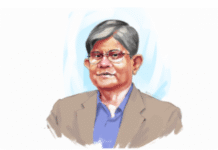Garment industry leaders sit with editors of newspapers

The garment sector’s apex trade body plans to prepare a central database of garment workers for ease of verification during crises.
“People always question the casualty numbers quoted during any tragedy in the garment sector, as the trade body does not have any central database of the 3.6 million workers,” Atiqul Islam, president of Bangladesh Garment Manufacturers and Exporters Association (BGMEA).
“We will sign an agreement with the ILO [International Labour Organisation] soon to prepare a central database of workers,” he added.
His comments came at an interactive session yesterday with editors and other senior journalists of newspapers.
The BGMEA has been holding a series of meetings with journalists in the aftermath of the Rana Plaza collapse, which killed more than 500 and injured thousands.
Islam said the trade body will send a letter to Pope Francis, who termed the working conditions in Bangladesh akin to “slave labour”.
The senior journalists also suggested the garment makers launch strong campaigns in the US and the European Union, to counter the propaganda against Bangladeshi garment products in the wake of the building collapse.
Abdul Quayum, associate editor of Prothom Alo, urged the garment owners to increase the workers’ salaries as inflation has swollen in the country, along with continuing with the sector’s reform activities.
Nurul Kabir, editor of New Age, recommended erecting a monument on the ground of Rana Plaza in honour of the dead workers. “The BGMEA can also make a shopping mall on the site.”
Imdadul Haque Milon, editor of the Kaler Kantho, suggested strengthening the relationship between the garment workers and the owners to avoid any untoward incidents in future.
Dewan Hanif Mahmud, editor of the Banik Barta, said it was the responsibility of the state to identify the risky buildings and to take measures against those owners.
Ajit Kumar Sarkar, city editor of official news agency BSS, said a proper database would remove confusion about information about the victims.









